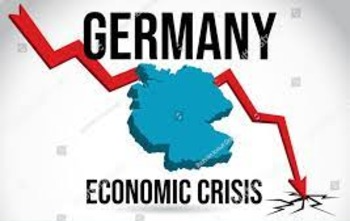Germany has been seeing a decline in its economy for several days. German Chancellor Olaf Scholz attributes this downturn to the uncertainty arising from the Ukraine conflict and the lingering effects of the Covid-19 pandemic. He asserts that the uncertainty surrounding Germany’s economic issues has contributed to the country’s current economic outlook.
Last week, Vice-Chancellor and Economy Minister Robert Habeck told legislators that “Germany is indeed in a particularly difficult situation” after abandoning Russian gas supplies. He admitted that the decision had led to the country losing its “competitive advantage.
Chancellor Scholz, in an interview with Die Zeit last Wednesday, characterized the prevailing atmosphere in Germany as “unsettled.”
Join us on Telegram: https://t.me/tfiglobal
“One feels the economic and political upheaval at home that the Russian attack on Ukraine has caused,” the chancellor said. Chancellor Scholz further asserted that Russian President Vladimir Putin relies on the discontent within Western nations, driven by high inflation and the ongoing conflict, to achieve his strategic goals.
Chancellor Scholz defended his traffic light coalition government, claiming that it does not take the “easy way” by avoiding conflicts. In response to concerns about dissatisfaction among Germans with his cabinet’s performance, Scholz highlighted, “In the previous 10-15 years, too much has been left dormant because governments avoided conflicts.”
He emphasized that Germany is currently undergoing a significant transformation to adapt to evolving economic realities. According to Scholz, this transformative process is inherently accompanied by feelings of uncertainty.
Last month, Chancellor Scholz accused Russia of interrupting gas deliveries to the EU, a claim dismissed by Russian President Putin as “complete nonsense.”
Read more: Germany’s Financial Struggle: Urgent Call for European Support
“The fact that Europe does not receive enough gas is their problem. Oddly enough, they have tried to blame it on us, that we weren’t selling or something,” Putin argued.
Before anti-Russian sanctions related to the Ukraine conflict, Germany obtained 40% of its gas from Moscow. In 2022, the country diversified its gas sources, increasing imports of liquefied natural gas (LNG) from tankers, Norway, and the Netherlands. However, these alternative sources come at higher prices, impacting Germany’s industrial sector.
A recent Bloomberg report, citing Germany’s Federal Statistical Office, suggests the country may be entering a recession, indicating a challenging economic situation. Despite this, Chancellor Scholz announced last week a commitment to allocate over €7 billion ($7.6 billion) for military aid to Ukraine this year.
Former German Foreign Minister Joschka Fischer acknowledged in an interview with Augsburger Allgemeine on Friday that Germany has faced significant economic challenges in the past two years, exacerbated by the loss of inexpensive energy. The country’s industrial production has experienced a more substantial decline than anticipated, affecting various sectors due to shortages of raw materials and increased energy prices.
Read more: Germany’s Economic Rollercoaster: Was Playing Superhero a Costly Mistake?
Fischer highlighted the current multifaceted challenges facing Germany, encompassing economic, technological, and security policy concerns. The absence of affordable Russian gas is identified as a crucial factor contributing to the economic predicament. Furthermore, he noted the transformation of the once advantageous Chinese export market into a potential threat.
Current statistics indicate that, despite a more than 50% reduction in pipeline gas imports, Germany is still incurring elevated costs for its natural gas supplies. This suggests that the country’s economy is grappling with the economic consequences of higher gas prices despite efforts to diversify its sources.
Hence, Germany is definitely undergoing an economic downturn, prompting concern from Olaf Scholz. The question arises: Is the economic distress a consequence of Germany extending aid to Ukraine while possibly neglecting its own economic interests? Think about it.
